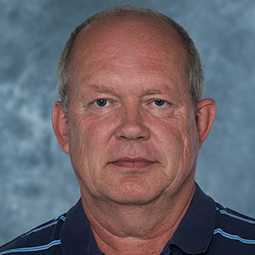Molinaroli College of Engineering and Computing
Faculty and Staff
Oleg S. Alexeev
| Title: | Research Professor |
| Department: | Chemical Engineering Molinaroli College of Engineering and Computing |
| Email: | alexeev@cec.sc.edu |
| Phone: | 803-777-9914 |
| Fax: | 803-777-8265 |
| Office: | Swearingen Engineering Center Room 3A61 301 Main Street Columbia, SC 29208 |

Education
- Ph.D., Boreskov Institute of Catalysis, Novosibirsk, Russia
- M.S., Novosibirsk State University, Novosibirsk, Russia
Research
Catalytic processes on surfaces take place through sequences of elementary reactions involving adsorbed reactants, products, and reaction intermediates associated with active sites on the catalyst surface. Our research goals are focused on fundamental understanding of the structure of the metal-support interface, structures of metal clusters on supports, and the influence of promoters on the structure and catalytic properties of supported metal clusters and aggregates. The objectives of our research program are pursued through an application of a combination of various experimental methods to the characterization of catalytic materials. Spectroscopic techniques, including TPD, TPR, FTIR, XPS, HRTEM, XRD, UV-Visible, and EXAFS, are used to characterize active sites of catalysts and adsorbed species under actual conditions of catalysis. Considerable information gained from these techniques along with the chemisorption and catalytic data is used to establish the dependence of catalytic properties on metal cluster or particle sizes, the structure of active sites, and the structure of the metal-support interface.
Selected Publications
- K. Khivantsev, A. Vityuk, H. A. Aleksandrov, G. N. Vayssilov, O. S. Alexeev, M. D. Amiridis. Catalytic conversion of ethene to butadiene or hydrogenation to ethane on HY zeolite-supported rhodium complexes: Cooperative support/Rh-center route. J. Chem. Phys. 2021, v. 154, pp. 184706-1-184706-14.
- A. Vityuk, S. Ma, O. S. Alexeev, M. D. Amiridis. NO reduction with CO over HY zeolite-supported rhodium dicarbonyl complexes: giving insight into the structure sensitivity, React. Chem. Eng. 2019, v. 4, pp. 418-426.
- A. Vityuk, K. Khivantsev, H. A. Aleksandrov, G. N. Vayssilov, O. S. Alexeev, M. D. Amiridis. Room-temperature ethene hydrogenation activity of transition-metal-free HY zeolites, ACS Catal. 2019, v. 9, pp. 839-847.
- K. Khivantsev, A. Vityuk, H. A. Aleksandrov, G. N. Vayssilov, D. Blom, O. S. Alexeev, M. D. Amiridis. Synthesis, modeling, and catalytic properties of HY zeolite-supported rhodium dinitrosyl complexes, ACS Catal. 2017, v. 7, pp. 5965-5982.
- E. A. Kyriakidou, O. S. Alexeev, A. P. Wong, C. Papadimitriou, M. D. Amiridis, J. R. Regalbuto. Synthesis of Ag nanoparticles on oxide and carbon supports from Ag diamine precursor. J. Catal. 2016, v. 344, pp. 749-756.